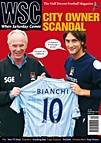 Russia in 1992 and Spartak Moscow begin their era of dominance. By Saul Pope
Russia in 1992 and Spartak Moscow begin their era of dominance. By Saul Pope
The long-term significance
To a background of hyperinflation, widespread poverty and rocketing alcohol-related deaths, Russia held its first national championship for almost 80 years. That previous championship ended in controversy; Odessa were not awarded the 1913 title due to fielding too many foreigners. Now, with the country in chaos, football was hardly a priority – attendances were down almost 50 per cent on 1991. However, these were the first shaky steps towards creating what is now one of Europe’s richest leagues, the Russian Premier League, thanks largely to the vast amounts of money pumped in by those who got rich during the privatisation of former state industries, which started in 1992.
Story of the season
The final Soviet Top League had contained just six Russian teams, thus the 1992 Russian equivalent was made up of the country’s 20 best-placed teams from the previous year, including sides that had been at the third Soviet level. The league was split into two preliminary groups, with the top four sides from each playing each other for the title and the rest scrapping it out to avoid one of five relegation spots. Moscow teams dominated the preliminary groups; Spartak lost just once and teams from the capital took the top two positions in both.
Spartak went one better in the final tournament, taking the title without losing. They also managed to win the cup, actually the final Soviet Cup, which had started the previous year. Breaking up the Moscow domination at the top of the table were Spartak (later known as Alania) Vladikavkaz, who in 1995 would become the only side from outside the capital to win the league. But Spartak dominated the league throughout the Nineties, winning nine of the first ten titles.
Further down the table, Asmaral Moscow, owned by an Iraqi-British businessman, finished in their highest ever position, as did Lokomotiv Nizhniy‑Novgorod and Okean Nakhodka; the latter’s Far Eastern location meant that most sides clocked up plenty of air miles.X
For the record books
Spartak might have won the double, but Dinamo’s Veli Kasumov was top scorer with 16 goals and soon moved to Real Betis. The winner of Russia’s top flight has never also produced the top scorer.
In what is perhaps a record for any league, seven of the 20 teams that took part in 1992’s Top League have since been thrown out of professional football due to financial difficulties. Spartak Vladikavkaz and Dinamo Stavropol were both excluded from the league but have started again on the bottom rung, Lokomotiv Nizhniy Novgorod and Asmaral Moscow have both been disbanded; Dinamo Tyumen pulled themselves out but have since returned; Rotor were denied a professional licence in 2005 but hijacked their reserve side, Rotor‑2 (who play in the Second Division), a year later; and Fakel Voronezh started 2007 in an amateur league.
Same place today
Four of the five Moscow big boys, Spartak, Lokomotiv, CSKA and Dinamo, have remained in the top flight for the entire post-Soviet period. Torpedo Moscow were relegated for the first time in the club’s history last year. Of the other sides, only Kril’ya Sovietov Samara have remained at this level throughout. Rostov and Zenit have only briefly dipped below; the latter are currently the side most likely to break the Moscow stranglehold on the title.
Moved furthest away
Bankrupt teams aside, some other participants of the 1992 Top League have all but disappeared off the radar. Textilshik Kamyshin, who played in the 1994 UEFA Cup, were relegated out of Russia’s regional third level in 1998, and spent four years in an amateur league. Okean managed just one more season in the top flight and have been also-rans at the third level for the last decade.
Went on to greater things
Oleg Veretennikov ~ Post-Soviet football’s top scorer, Veretennikov moved back to the side where he made his name, Rotor, in 1992, and has just wound up his playing career there at the age of 37. Despite his scoring record, he played only four games for the national side.
Dmitri Alenichev ~ Scorer of goals for Porto in UEFA Cup and Champions League finals, Alenichev was cutting his teeth at Lokomotiv in 1992 before joining Spartak in 1994. He is now a representative in the Upper House of Russia’s Federal Assembly.
Disappearing from view
Teams of homegrown players ~ The opening of the borders led to a trickle and later an influx of foreigners. Torpedo-Zil fielded the first all-foreign side in 2003, and non-Russians (such as the Brazilian Vágner Love) were an integral part of CSKA Moscow’s 2005 UEFA Cup triumph. National coach Guus Hiddink is worried.
Long-distance away trips ~ The collapse of the USSR and Okean Nakhodka’s 1993 meant that for 13 years the best Russian teams (historically based in the west of the country) didn’t have to travel 12,000 miles or more to fulfil league fixtures, till Luch Energiya Vladivostok’s promotion in 2006.
From WSC 247 September 2007